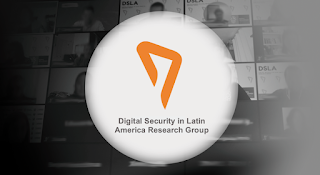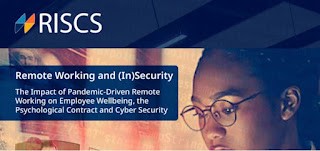Digital Security in Latin America - Early Perspectives on Establishing a Research Group: James Barr
“Some other countries are struggling, such as Mexico. They need to tackle crime, not cyber security.”
“The price of Chinese technology
is much more accessible compared to European or American companies. Paraguay
does not produce any technology.”
“In Latin America we can confuse
some platforms with the internet itself. The experience of going online is
through social media apps, this is a challenge.’’
“Latin America is the most
peaceful region regarding interstate conflict and most violent in interpersonal
conflict and/or violence. We have to shift focus more towards everyday violence
and the use of technology to oppress people.’’
These
quotes, captured in a workshop held by the Digital Security in Latin America
Research Group (DLSA) in December 2022, illustrate a very important (if
sometimes overlooked) point: the importance of context. By context we refer
essentially to how the digital relates to, shapes, and is shaped by the
on-the-ground realities emergent in a specific time and place.
Sofia,
Jess and I are all social, broadly qualitative researchers by background, with
a strong interest in Latin America. In early 2022, we started to chat about our
research ideas, proposals and plans. In doing so, we began to note some rather
intriguing themes. For instance, although some literature existed on issues of
digital security in Latin America, it was somewhat limited when compared to a
relative abundance written around other regions such as the USA and Europe.
Secondly, whilst interesting work was emerging from and on Latin American
digital security, much of it has been relatively siloed (though this in
fairness is a typical issue across all of academia). Indeed, our chats often led
to light academic crossover, where gaps apparent in one field had already been
addressed in another - we just needed pointing in its direction.
This
got us thinking. What do we need to research? How can we start to bridge the
gap between disciplines, and explore the interplay between these various
approaches in the context of Latin America specifically? Then it came to us … a
workshop would be a vehicle to bring together people from across the
disciplines and facilitate interdisciplinary dialogue! Great stuff! Indeed, we
soon realised that a workshop could, in the longer term, facilitate a research
group. Even better! But then, reality quickly hit us. Before considering that
lofty research group-based ambition, we first had to address a rather pressing
issue: how do you organise a workshop? Though we had some ideas, we thought it
best to start by consulting Professor Google.
After
a few weeks, we started to make headway. Initially, progress was made through
reflections on our own experiences at workshops, as well as simple chats with
more experienced heads versed in the art of workshop design. These various
chats were fruitful. Not only did they not tear our idea to shreds, but they
also even kindly suggested that it was a very good one. They pointed us to certain
people, who pointed us to other people, and over time we developed an idea of
what needed doing. This included:
● Planning
a theoretical workshop session, including some starter questions and themes for
keynote speakers to address.
● Finding
some keynote speakers to attract the masses.
● Making a
list of potential participants with relevant expertise.
● Finding
an online venue (being a workshop on Latin America, we ensured we could
facilitate participation from researchers who are based in Latin America).
Of
course, progression is never linear. It was challenging finding the right
people to talk to. For instance, it took us far too long to realise that we
should look to support from within the Royal Holloway CDT, particularly
considering the weight of experience, and the CDT’s interdisciplinary focus.
Indeed, our own project reflected this latter ethos. Over time, with a bit of
thought and elbow grease, we managed to pull together a surprisingly lengthy
and strong list of names who, after a round of emails, were more than happy and
indeed excited to attend!
So,
we had the idea, the plan of action, the list of participants, and amazing
keynote speakers. However, we quickly realised that we needed some extra hands
to run the sessions. From moderation to note taking, we wanted the workshop to
allow all participants a voice and for that voice to be properly noted down for
a report. Those people were absolutely crucial in the smooth running of the
workshop, and we could not have done it without them.
After
months of planning and hard work the day of the workshop came. We had two
brilliant keynotes to prompt discussion, and the long and the short of it is
that it was a hugely productive session. We covered quite a variety of topics
and perspectives, a variety derived largely, we suspect, from the breadth of
experience and backgrounds present at the workshop. There were plenty of
insights from the workshop, as the twenty-odd page report indicates, but some
of the key points were as follows:
● There are
many restrictions to researching cyber security in Latin America. Though more
courses are becoming available, challenges remain as research areas remain
siloed and there is little interdisciplinarity.
● Cyber
security policy in the region is for the most part reactive. It draws from
international best practices but is not always adjusted to fit the Latin
American context.
● There
exists a duality between Latin American approaches to cyber security and
relationships with the west in shaping them. Partnerships with western states,
and in turn the emulation of western state practice, are often seen as measures
of cyber security maturity or capability. However, there also exists an
appetite amongst Latin American states to pursue their own independent cyber
security approaches.
● Processes
of political change and the impacts that these have on issues of cyber
security, must be understood against a broader backdrop of historical and
current conflict.
● When it
comes to the practice of cyber security, a divide exists between the policy and
the grassroots level. Strategies and policies may satisfy international
standards and requirements, but may do little to address local realities and
concerns (what might be termed the cyber security of the ‘everyday’).
We
will not analyse these points here since the report does this in a far more
concise and nuanced manner. Nonetheless, some of the more subtle findings on
the tensions between the emulation of western best practice, versus the want
for independent cyber security approaches, were of real interest. This issue
and the constant references to the need for everyday perspectives and
approaches, calls which again reflect the motives of our own PhD programme, are
something we think merit further inquiry. Moreover, it is fascinating to note
that many of our initial conceptions around the state of the field were
reflected in the comments of our participants: research is siloed and at times
limited.
Pulling
this workshop together was not an easy process, but it was a worthwhile one,
both for the voices foregrounded, the people it brought together and as a means
to generate new and exciting research (and hopefully further research
opportunities). We plan to keep up the momentum and try to put together a few
more workshops over the year, addressing some of the themes mentioned above,
alongside short articles, blog posts and more. We will keep you posted!
Read
our report
Follow us on Twitter
Find out more about the research group
Contact: dsla.connect@gmail.com



Comments
Post a Comment